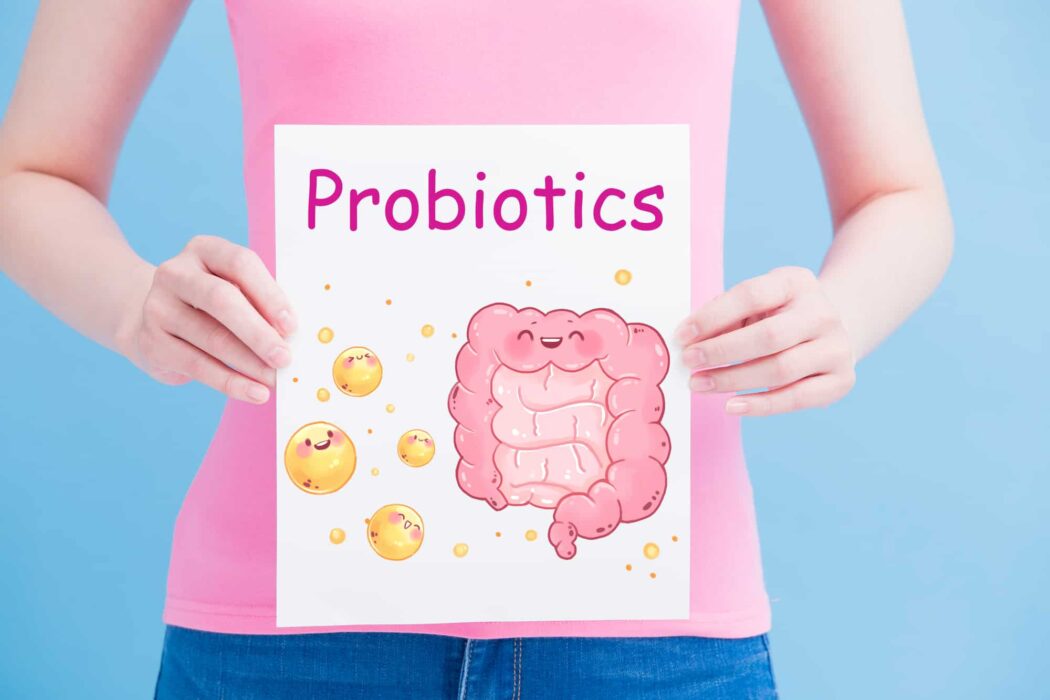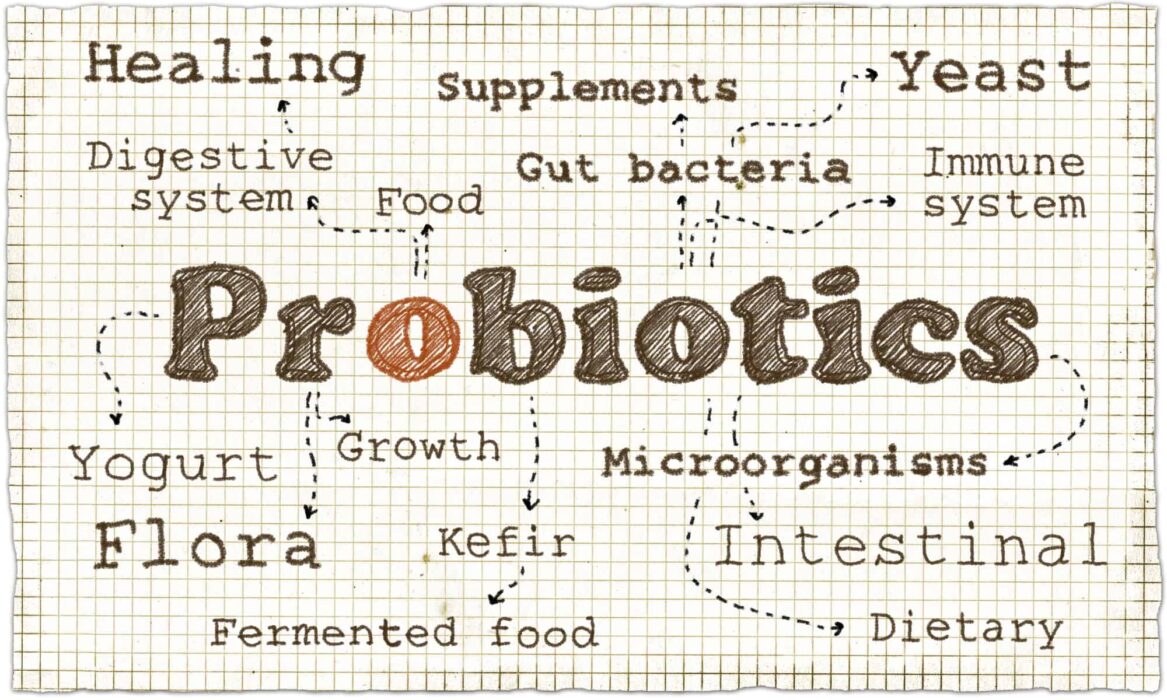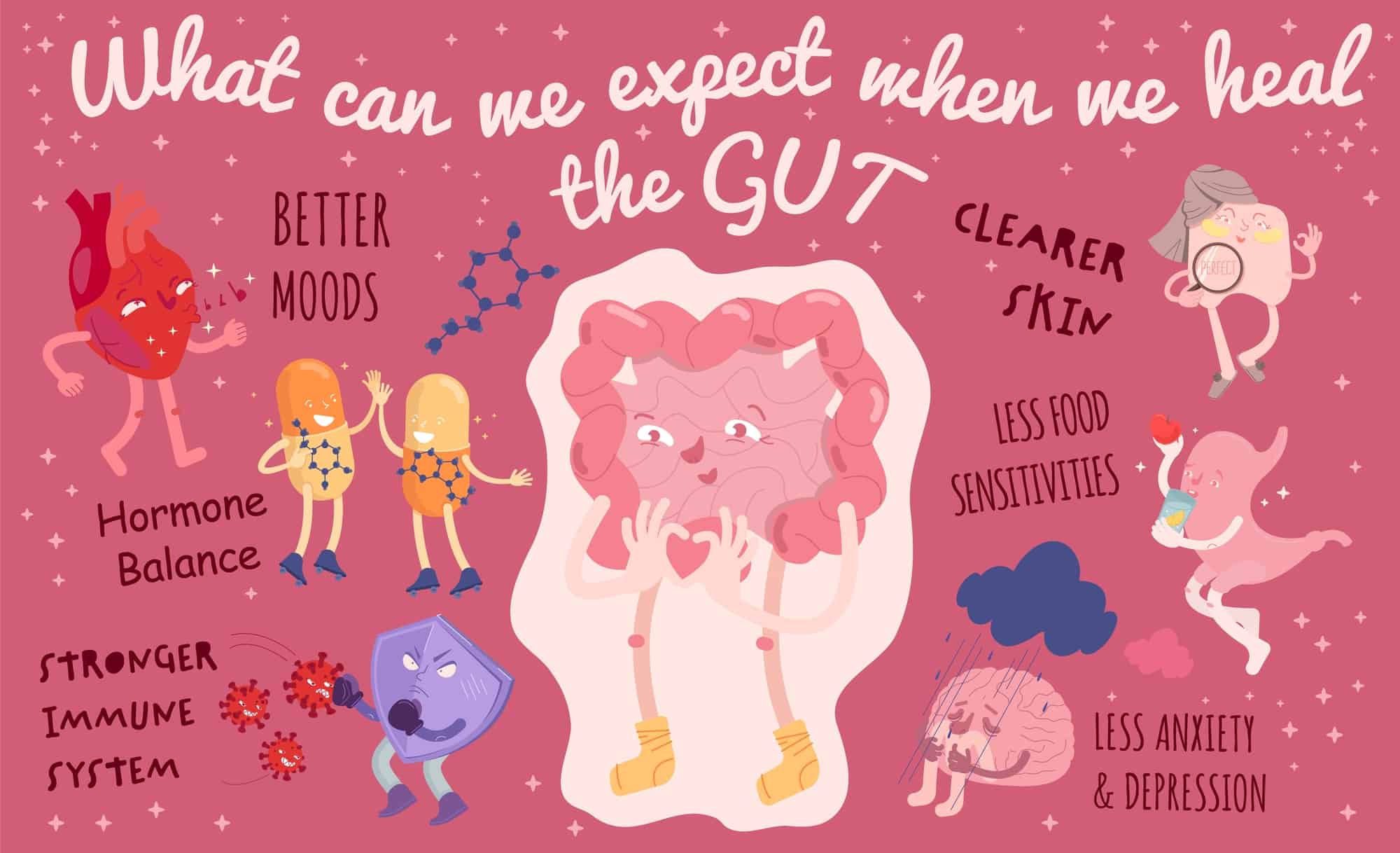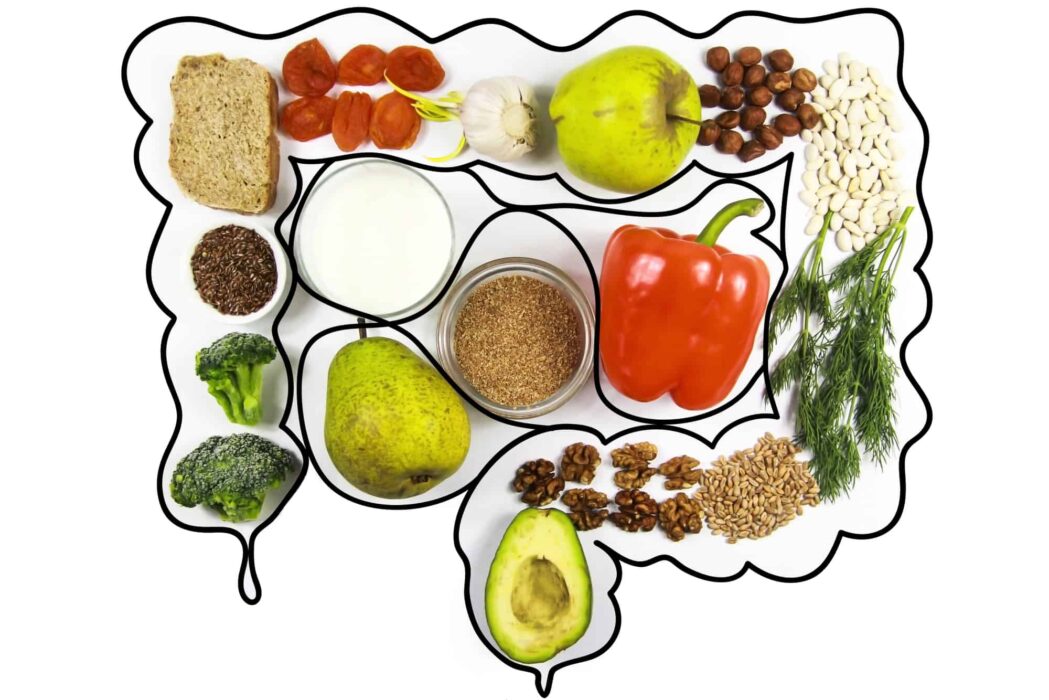Last time we have discussed the 11 best supplements for the keto diet. You can use all of them or choose some according to your needs. However, I want to talk about one category in more detail. These are keto probiotics.
Do you need probiotics on a keto diet? Are they necessary? How does a lack of carbs and a large amount of fat affect your digestion? How does keto affect your gut health, and how can you help your digestive system while on a low-carb diet? Let’s take a look at all these questions in detail!

What are Probiotics?
Probiotics are live microorganisms that can provide health benefits when consumed in appropriate amounts. Maintaining good levels of probiotics in the body can improve immunity, metabolism, and digestive health [1].
The two most well-known probiotics for immune and digestive health are:
- Bifidobacterium (more commonly found in the large intestine)
- Lactobacillus (found in the small intestine).
Other microorganisms can also be classified as probiotics, such as the yeast Saccharomyces boulardii.
Keto Bodybuilding: How to Build Muscle Without Carbs?
Many foods and supplements contain live microorganisms, but only those containing strains with scientifically proven health benefits can be called probiotics. The main source of probiotics in the diet is fermented foods. Microorganisms and sugar (which is food for them) are used for their production. Bacteria eat simple carbs and multiply. Then they secrete compounds that give a special taste. Fermented foods include yogurt, sauerkraut, kombucha, kimchi, pickles, miso, cheese, and sourdough bread. However, not all fermented foods contain live bacteria. For example, cheeses are pasteurized, and sourdough bread is baked at a high temperature. Beneficial bacteria die under these conditions.
The human stomach is an unfavorable environment for probiotics. Therefore, the more bacteria in the food, the higher the likelihood that some will survive and reach the intestines. Studies show that the survival of bacteria in gastric juice is improved in the presence of simple carbs [2]. These are glucose, fructose, sucrose, and lactose. Lactose is the sugar found in dairy foods.
Therefore, yogurt with enough microorganisms can be a good source of probiotics. However, it is not worth adding sugar to improve the survival of bacteria since it does not contain useful elements. Instead, you can add berries and get an extra serving of vitamins and fiber.
How to Increase the Proportion of Probiotic Bacteria if You Are Lactose Intolerant?
Lactose intolerance is connected with lactase deficiency. Lactase is an enzyme that breaks down lactose in the small intestine. When this enzyme is low, lactose enters the large intestine and interacts with microbiota bacteria. It usually causes unpleasant symptoms.
Lactose intolerance acts differently in different people. For example, some people cannot drink cow’s milk, but they tolerate dairy foods and cheese. Others cannot tolerate anything that contains lactose. In the latter case, you can ask your doctor or nutritionist about enzyme supplements that help the body break down lactose.
Like many other beneficial bacteria, Lacto- and bifidobacteria feed on prebiotics (certain types of fiber) [3]. Therefore, if you cannot or do not want to eat probiotic foods for some reason, you can add prebiotic-rich foods to your diet. For example, onions, tomatoes, bananas, leeks, apples, asparagus, garlic, and rye bread contain a type of prebiotic that bifidobacteria feed on.

Probiotics on the Keto Diet
So now you know that the good bacteria in your gut love sugar and complex carbs. However, when on a keto diet, you avoid carbs by getting them in a small amount from green vegetables and some berries. So how do you increase the number of beneficial bacteria during a low-carb diet? Sure, you can eat Greek yogurt and sauerkraut, but will that be enough? What if you’re lactose intolerant or vegan and can’t eat yogurt?
Any change in diet, especially such an extreme one, always entails restructuring the digestive system. Moreover, no matter what healthy diet you choose, the process of adaptation is inevitable. I recommend consuming probiotics while on a keto diet to support your digestive system. Even if you eat plenty of vegetables and cut most carbs out of your diet, you can easily run into a lack of fiber. It will make you feel bloated and constipated. In addition, a large amount of fat at first can cause stomach discomfort and indigestion [4].
Whether you’re on keto or not, probiotics are multi-functional supplements that support overall health. Consuming quality probiotic supplements is a great way to improve your gut microflora, enhance digestion, and boost your immune system.
Here are important rules to consider when purchasing probiotic supplements:
- The composition should contain probiotic cultures: Lactobacillus, Bifidobacterium, propionic acid bacteria (Propionibacterium), streptococci of the species Streptococcus thermophilus, and bacteria of the genus Lactococcus.
- The supplement should contain a large number of probiotics – from 15 to 100 billion.
Keto and Gut Health
Many studies report that the keto diet can improve the health of your digestive system. First of all, it reduces inflammation, affecting your gut health to a large extent [5]. Acute inflammation is an immune response that protects your body from disease and infection. Chronic inflammation of the digestive system can contribute to the development of digestive problems. For example, it can be Crohn’s disease and ulcerative colitis. Some research suggests that the keto diet can help reduce inflammation in your body and ease the symptoms of these diseases if you already have them.
Also, a low-carb diet can help with some digestive disorders. For example, it improves multiple symptoms of irritable bowel syndrome [6], flatulence, stomach cramps, and diarrhea. It is due to the restriction of sugars and complex carbs, which provoke all these processes.
Often, keto foods with good fats, fiber, and no carbs positively affect your digestive system [7]. Here are some examples of their useful properties:
- Avocados are rich in heart-healthy fats and fiber, providing 10 g of fiber per large fruit.
- Leafy vegetables, such as arugula, spinach, lettuce, and some types of cabbage (kale, Brussels sprouts, etc.) can also be beneficial. There have few carbs, and their fiber contains many other healthy nutrients, such as antioxidants and vitamins C and K.
- Coconut oil. Coconut oil can reduce intestinal inflammation and improve microflora.
- Sauerkraut and other fermented vegetables. Fermentation boosts beneficial bacteria (natural probiotics) to support gut health.
- Quality butter contains butyric acid (a short-chain fatty acid). It improves digestive health and may also reduce symptoms of inflammatory bowel disease.

Can Keto Harm Your Gut Health?
Some research suggests that following a ketogenic diet can be harmful to the health of your digestive system for several reasons [8]. First, your meals may contain less fiber than your previous meal plan. The keto diet eliminates all high-carbohydrate foods such as grains, fruits, starchy vegetables, and legumes. Many of these foods are rich in fiber, which is essential for digestion. Fiber moves through the entire digestive tract to promote healthy bowel function. Daily intake of fiber can prevent some gut disorders such as bloating, stomach ulcers, hemorrhoids, reflux, leaky gut syndrome, etc.
Insufficient fiber intake can increase the risk of constipation. To meet your fiber needs while on a keto diet, eat a variety of high-fiber, low-carb foods, such as non-starchy vegetables and low-sugar fruits.
Also, the keto diet is capable of harming your intestinal microflora [9]. It plays a key role in many aspects of health, including digestion, immune function, mental health, and disease prevention. Some studies note that the keto diet can disrupt the concentration and composition of gut bacteria. According to medical statistics, the keto diet is associated with several changes in the gut. They include increased inflammatory responses and decreased amount of beneficial fatty acids. To avoid this, you should include probiotics in your diet and consume enough Omega-3 fatty acids.
However, other studies provide positive results. For example, there are studies noting a decrease in the concentration of harmful bacteria as a result of the keto diet.
Thus, if your keto meal plan is not correct, the keto diet can be deficient in fiber and can impair the health of your gut microbiome by increasing inflammation and reducing the concentration of beneficial bacteria. And while research is controversial, you should look after your gut health on a keto diet by increasing your fiber intake and using probiotic supplements.

Conclusion
So, in summary, I can say that probiotics should be part of any diet, and the keto diet is no exception. They will help you eliminate unpleasant adaptation symptoms and improve the health of your digestive tract. If you are eating enough fiber while on keto and avoiding processed foods but are experiencing unpleasant gut symptoms, you should see a doctor.
How to Curb Sugar Cravings on Keto?
It’s also worth noting that digestive health problems can worsen your results on a keto diet. This is due to the fact that the keto diet is high in fat, and in the case of gut disorders, you can absorb fat poorly and achieve ketosis worse. Also, disruption of your microbiome can lead to poor digestion if you eat a few vegetables and ignore probiotics. Therefore, I recommend that you consult your gastroenterologist if you are experiencing digestive problems on a keto diet.
Sources:
- Kechagia M, Basoulis D, Konstantopoulou S, et al. Health benefits of probiotics: a review. ISRN Nutr. 2013;2013:481651. Published 2013 Jan 2. doi:10.5402/2013/481651
- Shi LH, Balakrishnan K, Thiagarajah K, Mohd Ismail NI, Yin OS. Beneficial Properties of Probiotics. Trop Life Sci Res. 2016;27(2):73-90. doi:10.21315/tlsr2016.27.2.6
- Markowiak P, Śliżewska K. Effects of Probiotics, Prebiotics, and Synbiotics on Human Health. Nutrients. 2017;9(9):1021. Published 2017 Sep 15. doi:10.3390/nu9091021
- Crosby L, Davis B, Joshi S, et al. Ketogenic Diets and Chronic Disease: Weighing the Benefits Against the Risks. Front Nutr. 2021;8:702802. Published 2021 Jul 16. doi:10.3389/fnut.2021.702802
- Reddel S, Putignani L, Del Chierico F. The Impact of Low-FODMAPs, Gluten-Free, and Ketogenic Diets on Gut Microbiota Modulation in Pathological Conditions. Nutrients. 2019;11(2):373. Published 2019 Feb 12. doi:10.3390/nu11020373
- Chimienti G, Orlando A, Lezza AMS, et al. The Ketogenic Diet Reduces the Harmful Effects of Stress on Gut Mitochondrial Biogenesis in a Rat Model of Irritable Bowel Syndrome. Int J Mol Sci. 2021;22(7):3498. Published 2021 Mar 28. doi:10.3390/ijms22073498
- Attaye I, van Oppenraaij S, Warmbrunn MV, Nieuwdorp M. The Role of the Gut Microbiota on the Beneficial Effects of Ketogenic Diets. Nutrients. 2021;14(1):191. Published 2021 Dec 31. doi:10.3390/nu14010191
- Ang QY, Alexander M, Newman JC, et al. Ketogenic Diets Alter the Gut Microbiome Resulting in Decreased Intestinal Th17 Cells. Cell. 2020;181(6):1263-1275.e16. doi:10.1016/j.cell.2020.04.027
- Paoli A, Mancin L, Bianco A, Thomas E, Mota JF, Piccini F. Ketogenic Diet and Microbiota: Friends or Enemies?. Genes (Basel). 2019;10(7):534. Published 2019 Jul 15. doi:10.3390/genes10070534